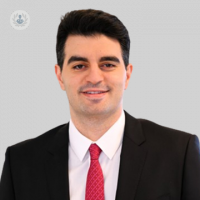Retzius sparing prostatectomy: a quick guide
Written in association with:A Retzius-sparing prostatectomy is a surgical technique aimed at removing the prostate gland while preserving the Retzius space, a potential space between the bladder and the pelvic floor. This approach seeks to minimise damage to surrounding structures, potentially reducing postoperative complications such as urinary incontinence and sexual dysfunction.
Distinguished consultant urological surgeon Mr Wissam Abou-Chedid discusses the surgery, including its potential benefits and the ideal candidate for the surgery.

What is a Retzius-sparing prostatectomy?
Retzius-sparing prostatectomy is a surgical technique used to remove the prostate gland while preserving the Retzius space which is a virtual space between the bladder and the pubic bone. This technique involves making small incisions in the abdomen, through which specialised surgical instruments and a camera attached to robotic arms are inserted. The surgical robot assists the surgeon in delicately removing the prostate gland while avoiding damage to surrounding structures.
The Retzius-sparing prostatectomy technique allows meticulous dissection and removal of the prostate gland while sparing surrounding anatomical structures to minimise postoperative complications such as urinary incontinence and erectile dysfunction.
What are the potential benefits of Retzius-sparing prostatectomy?
Recovery of urinary function: Compared to traditional radical prostatectomy, Retzius-sparing prostatectomy offers a lower risk of urinary incontinence. This is because the technique aims to minimise damage to the muscles and nerves controlling bladder function, resulting in better post-surgery urinary continence. Patients undergoing this procedure may regain urinary continence more quickly than those undergoing traditional surgery.
Erectile dysfunction: Retzius-sparing prostatectomy also aims to preserve erectile function by reducing nerve damage during surgery. Studies have shown that patients who undergo this technique have better preservation of erectile function compared to those undergoing traditional prostatectomy.
Penile shortening: Retzius-sparing prostatectomy has been associated with a reduced risk of penile shortening compared to traditional methods, which can impact sexual function and quality of life.
Inguinal hernia: There is a lower risk of developing inguinal hernia after Retzius-sparing prostatectomy, which can occur due to weakening of the abdominal wall during surgery.
Peyronie's disease: Retzius-sparing prostatectomy is also associated with a reduced risk of Peyronie's disease, a condition characterised by the development of fibrous scar tissue inside the penis, which can cause curvature, pain, and erectile dysfunction.
Oncological drawbacks and effectiveness in removing cancerous tissue
There are no significant oncological drawbacks to the Retzius-sparing approach. Studies indicate that the technique is as effective as traditional methods in removing cancerous tissue.
Research comparing the two methods has found that when the surgery is performed by an expert surgeon with extensive expertise in this technique, there is no increase in the risk of positive surgical margins, indicating that cancer removal is comparable between the two approaches.
Technical challenges and candidacy for Retzius-sparing procedure
The Retzius-sparing procedure is more technically challenging for surgeons to perform compared to traditional methods. It requires specialised surgical skills and expertise due to its complexity.
It should be noted that not all patients may be suitable candidates for this surgery. Patients with larger prostates or more advanced cancer may not be ideal candidates for Retzius-sparing prostatectomy due to the increased surgical difficulty. Additionally, suitability for this procedure should be assessed on an individual basis by a qualified surgeon.
Long-term data on patient outcomes
While promising short-term results have been reported, there is limited long-term data comparing the Retzius-sparing method to traditional methods in terms of patient outcomes. Long-term studies are needed to fully assess the safety and efficacy of Retzius-sparing prostatectomy.
How many of Retzius-sparing prostatectomies have you performed?
In the last two years, I've successfully completed over 300 robotic-assisted Retzius-sparing radical prostatectomies. This significant number places my patient cohort among the fastest-growing series for a single consultant in Europe for this surgical technique.
If you are contemplating a Retzius-sparing prostatectomy and would like to book a consultation with Mr Abou-Chedid, do not hesitate to do so by visiting his Top Doctors profile today.


